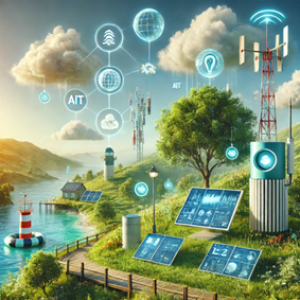
Harnessing IoT and AI for Environmental Monitoring: Innovations at Fujairah Research Centre
Environmental conservation today is more pressing than ever, and technology plays a crucial role in addressing ecological challenges. With the power of the Internet of Things (IoT) and Artificial Intelligence (AI), we are able to observe, interpret, and respond to changes in our environment with unprecedented speed and accuracy. At Fujairah Research Centre (FRC), our mission is to develop and deploy innovative solutions that help monitor and protect our natural surroundings. Through IoT and AI technologies, we are transforming how environmental data is gathered, analyzed, and applied across projects as diverse as weather tracking, marine health monitoring, and wildlife conservation. This blog will explore FRC’s environmental monitoring initiatives, the obstacles encountered in our journey, and the significant impact of these technologies on sustainability.FRC is committed to sustainable environmental solutions, leveraging technology to make real-time data accessible for better decision-making. Our projects, such as smart weather stations, marine buoys, and Camel’s tracking systems, have been specifically designed to gather valuable data across different ecosystems in the UAE. Each initiative supports stakeholders—from researchers to policymakers—with accurate, actionable insights that guide strategies to protect and preserve natural resources. By empowering local communities and decision-makers with the right information, we enable a more resilient approach to environmental challenges.At the core of our environmental monitoring systems is a network of sensors capturing comprehensive data. For instance, FRC’s smart weather stations monitor temperature, humidity, wind speed, particulate matter, and gases. These stations continuously transmit data to centralized cloud databases, where our AI models process it to identify patterns and anomalies. Such data-driven insights are essential for anticipating environmental changes, responding to weather events, and improving air quality.
Our marine buoy project is another vital application of IoT in environmental monitoring. These buoys, equipped with advanced sensors, track essential water parameters like temperature, pH, salinity, and pollutants. Through cellular networks, the data is sent to our cloud platform, where machine learning algorithms help analyze marine ecosystem health. The ability to detect issues like oil spills or harmful algal blooms in real time allows for swift responses, helping mitigate potential ecological damage. This is especially relevant to FRC’s goal of enhancing marine preservation efforts along the UAE’s coastline.Moreover, FRC’s Camel tracking project exemplifies how AI can contribute to sustainable livestock management. We have designed an IoT-based camel tracking system that uses sensors to monitor movement, health, and behavioral patterns of camels in desert conditions. These systems are crafted to endure the extreme heat and require minimal power, ensuring reliable long-term monitoring. The project not only assists in optimizing livestock care but also upholds traditional cultural practices around camel racing, a significant part of UAE heritage.
While IoT and AI offer powerful tools for environmental monitoring, implementing these technologies comes with unique challenges. Durability is one of the primary concerns, as equipment must withstand tough conditions like high temperatures, humidity, and salinity. For example, our marine buoys need materials resistant to corrosion, and our weather stations and animal trackers must operate seamlessly in desert climates that frequently exceed 40°C. We continuously work on refining hardware and enclosures to enhance resilience and ensure consistent performance in these challenging settings.Another key area is power efficiency. Many of our remote systems, like weather stations and camels trackers, are powered by solar energy or batteries, which makes power management critical. To address this, FRC explores low-power solutions, innovative energy storage technologies, and efficient power cycling to extend the operational lifespan of these monitoring systems without requiring frequent maintenance.Communication is another focal point of FRC’s ongoing research. In projects like camel tracking, covering large desert expanses presents connectivity challenges. By exploring long-range communication protocols, such as Bluetooth Low Energy (BLE) mesh networks and RF systems, FRC aims to ensure robust, uninterrupted data transmission over significant distances. Reliable connectivity enables more consistent data, improving the accuracy of our analyses and predictions.The impact of FRC’s efforts in environmental monitoring is far-reaching. By leveraging IoT and AI, we provide invaluable tools for environmental sustainability. Real-time environmental data enables proactive decisions for resource management and pollution control, benefiting public health and aiding conservation. For instance, better air quality monitoring can inform policies that protect both the environment and human health, while real-time data on marine conditions preserves marine life and supports the tourism sector by keeping coastal waters clean and safe.Looking to the future, FRC is focused on enhancing our systems with predictive and prescriptive analytics. Predictive models will allow us not only to recognize current trends but also to forecast future environmental conditions. For instance, early detection of climate patterns could enable preventative actions against extreme weather, while understanding shifts in marine ecosystems might help avoid ecological disruptions. Another exciting area is the integration of blockchain for data security, which can establish transparent, verifiable records of environmental data, increasing trust and accountability in our monitoring practices.
IoT and AI have transformed environmental monitoring, offering unprecedented capabilities for real-time observation, analysis, and decision-making. At Fujairah Research Centre, we are dedicated to advancing these technologies to meet the pressing environmental challenges of today and tomorrow. Through projects like smart weather stations, marine buoys, and camel tracking systems, we aim to create a more sustainable and resilient ecosystem in the UAE. As we continue to innovate, our commitment to data-driven solutions remains at the heart of our mission to foster a greener, more sustainable future for generations to come.
